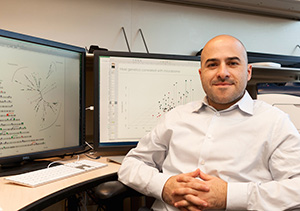March 4, 2016:
Among cancers that affect both men and women, colorectal cancer (cancer of the colon or rectum) is the second leading cause of cancer deaths in the United States. The Centers for Disease Control and Prevention (CDC) reports that every year about 140,000 Americans are diagnosed with colorectal cancer, and more than 50,000 people die from it.
March is “Colorectal Cancer Awareness Month,” a time to purposefully support patients, rally researchers, and educate all, as we focus on reducing the burden of and working toward a cure for this deadly disease. The member institutions of the Big Ten Cancer Research Consortium continue leading this charge, united in purpose and diverse in talent.
Masonic Cancer Center:
Aasma Shaukat, MD, MPH, member of the Screening, Prevention, Etiology and Cancer Survivorship Program, noted “The Masonic Cancer Center is a member of the National Colon Cancer Roundtable, a coalition of 500 member organizations with the mission to increase colon cancer screening rates to 80% by 2018 (we are currently at 64% nationally).”
Expanding our understanding of the gut “microbiome”

Ran Blekhman, PhD. Photo courtesy of College of Biological Sciences, University of Minnesota / Jonathan Pavlica.
Identifying the cystic fibrosis gene as a colorectal cancer driver
Cystic Fibrosis (CF) is caused by a mutation in a gene that regulates the electrical balance between cells and the surrounding environment. The main symptoms are difficulty breathing and lung infections, which are caused by excessive mucus in the lungs. In the past, children with CF did not survive past one year, but now, due to improved detection and treatment people are living much longer, with a median survival of about 40 years. An unfortunate finding, now that patients survive longer, is that CF patients have a higher rate of colorectal cancer. This finding was reported by University of Minnesota gastroenterologist, Alex Khoruts, MD, in the Journal of Clinical Gastroenterology, 2014.
Using mouse models of intestinal cancer, Masonic Cancer Center researchers Tim Starr, PhD, Robert Cormier, PhD, and David Largaespada, PhD, found that mutations in the gene that causes CF, the Cystic Fibrosis Transmembrane Conductance Regulator (CFTR) can also cause colon cancer (Starr, et al., Science 2009; Starr et al., PNAS 2011; Than et al., Oncogene 2016). Additionally, this same team of researchers found another gene that also regulates the electrical balance in our bodies (KCNQ1) can contribute to colon cancer development (Than; Oncogene 2013). Based on these findings it is possible that drugs developed to combat cystic fibrosis and drugs that regulate the electrical balance within cells may represent a new therapeutic option for patients with colon cancer. Read more.
Investing the time it takes
Masonic Cancer Center researchers completed a study through the Minneapolis VA Medical Center that found that there is a threefold higher rate of colon cancer among patients whose doctors took less than six minutes to inspect their colons versus those whose screenings lasted more than six minutes. The researchers reviewed 76,801 colonoscopy records between 2004 and 2009 and tracked the cancer histories of patients in the five years after they were screened. This is the first research to link longer screenings with lower colon cancer risks. Read more.
University of Wisconsin Carbone Cancer Center: An Aspirin a day keeps colorectal cancer away?
Count UW Carbone Cancer Center physician and researcher Dustin Deming, MD, as one of the many doctors now considering aspirin as a long-term care option for patients at risk for colorectal cancer. “Not everyone should pop the top of their aspirin bottles if they’re worried about colon cancer,” says Dr. Deming.
“In a summary of recent studies, the USPSTF has identified that aspirin reduces the risk of developing colorectal cancer and death from colorectal cancer 10 or more years after initiation,” Dr. Deming says. “All patients over 40 years of age should discuss with their health care providers if they would benefit from a daily aspirin regimen.”
Dr. Deming echoes the sentiments of the health care community in stressing the importance of talking to your doctor prior to turning to aspirin in the prevention of colorectal cancer. Read more.
University of Michigan: Colorectal cancer in younger people linked to more advanced disease but better survival
The study by researchers at the University of Michigan Comprehensive Cancer Center also found that younger patients were more likely to have advanced disease. The authors suggest this is in part because they are diagnosed only after their cancers have grown large enough to cause symptoms.
“Colorectal cancer has traditionally been thought of as a disease of the elderly. This study is really a wake-up call to the medical community that a relatively large number of colorectal cancers are occurring in people under 50,” says study author Samantha Hendren, MD, MPH, associate professor of surgery at the University of Michigan Medical School. Read more.
Less financial burden for cancer patients with paid sick leave, study finds
In a survey of more than 1,300 patients with stage 3 colorectal cancer, researchers found that only 55 percent who were employed at the time of diagnosis retained their jobs after treatment. Patients who had paid sick leave were nearly twice as likely to retain their jobs as those without paid sick leave.
“Paid sick leave can really support working Americans who have cancer or other issues as they go through their treatment,” says Veenstra, who is a member of the U-M Institute for Healthcare Policy and Innovation. “It may help patients retain their jobs and alleviate the financial strain associated with cancer treatment. Read more.
Northwestern Medicine: Coffee Associated with Colon Cancer Survival

Al B. Benson, III, MD, professor of Medicine in the Division of Hematology/Oncology, contributed to a paper that demonstrates an association between drinking coffee and decreased rates of colon cancer recurrence and mortality.
Following up a median of seven years after patients completed the questionnaires, the investigators determined that those who had consumed four or more cups of coffee a day were 42 percent less likely to have their cancer return compared to non-coffee drinkers, and they were 33 percent less likely to die from cancer or any other cause.
“There has been a great deal of interest in looking at diet and lifestyle factors as prevention strategies for colorectal cancer,” said Dr. Benson, professor of medicine in the Division of Hematology/Oncology. “It seemed that if these factors might contribute to an increased or decreased risk of developing colon cancer, it would be wise to study these factors for people who already have cancer, too.” Read more.
You Can Join the Fight Against Cancer
![]() Did you know you can directly support the team efforts of the Big Ten Cancer Research Consortium? Make a gift today!
Did you know you can directly support the team efforts of the Big Ten Cancer Research Consortium? Make a gift today!
This story was compiled by Alecia Burkhardt, communications associate for the Big Ten Cancer Research Consortium, with contributions from the University of Minnesota Masonic Cancer Center, UW Carbone Cancer Center, the University of Michigan Comprehensive Cancer Center, and the Robert H. Lurie Comprehensive Cancer Center of Northwestern University.
About the Big Ten Cancer Research Consortium: The Big Ten Cancer Research Consortium was created in 2013 to transform the conduct of cancer research through collaborative, hypothesis-driven, highly translational oncology trials that leverage the scientific and clinical expertise of Big Ten universities. The goal of the Big Ten Cancer Research Consortium is to create a unique team-research culture to drive science rapidly from ideas to new approaches to cancer treatment. Within this innovative environment, today’s research leaders collaborate with and mentor the research leaders of tomorrow with the unified goal of improving the lives of all patients with cancer.
About the Big Ten Conference: The Big Ten Conference is an association of world-class universities whose member institutions share a common mission of research, graduate, professional and undergraduate teaching and public service. Founded in 1896, the Big Ten has sustained a comprehensive set of shared practices and policies that enforce the priority of academics in the lives of students competing in intercollegiate athletics and emphasize the values of integrity, fairness and competitiveness. The broad-based programs of the 14 Big Ten institutions will provide over $200 million in direct financial support to almost 9,500 students for more than 11,000 participation opportunities on 350 teams in 42 different sports. The Big Ten sponsors 28 official conference sports, 14 for men and 14 for women, including the addition of men’s ice hockey and men’s and women’s lacrosse since 2013. For more information, visit www.bigten.org.
















Subscribe to the Big Ten CRC Newsletter X
X Facebook
Facebook YouTube
YouTube